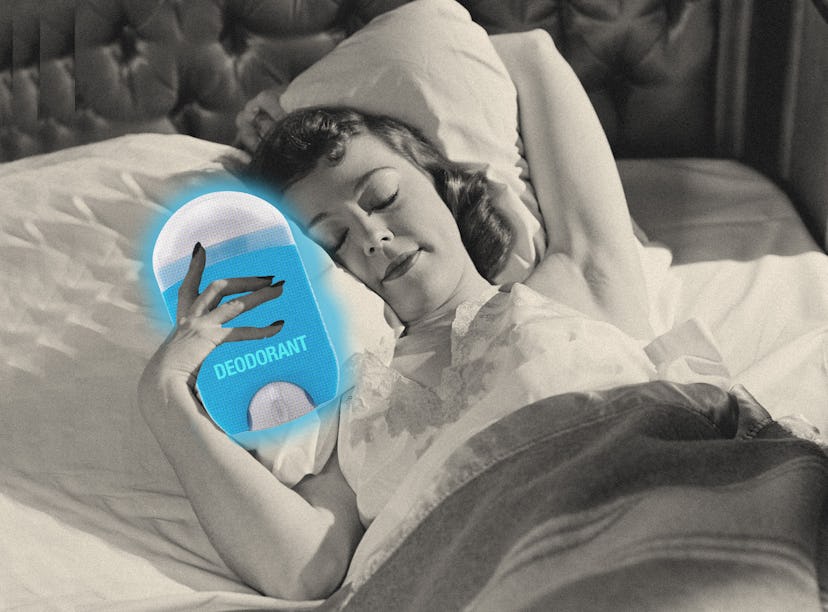
There are two types of people in this world: Those who wear deodorant to bed, and those who don’t. (According to an ongoing internet debate, at least.) On the one side are the folks who prefer to let their pits breathe while they sleep. On the other are people who slick on deodorant before bed with the thought that it works better when applied at night.
While neither side is necessarily wrong, dermatologists are here to set the record straight, once and for all, about the best time to apply. But before getting into whether or not you should wear deodorant to bed, let’s talk about the difference between antiperspirant and deodorant, since what you’re using makes a huge difference when it comes to the recommended application time, and ultimately how much you’ll sweat.
As board-certified dermatologist Dr. Marisa Garshick, M.D., FAAD explains, antiperspirants are products designed to block the release of sweat, often using aluminum, while deodorants are fragrant sticks that mask odor or absorb moisture. “Some products exist as deodorants, some exist as antiperspirant, and some exist as a combination of the two, so it’s important to know what you are using,” she tells Bustle.
While it’s ultimately up to you to figure out when you want to wear deodorant, keep reading to see what the experts say about the great debate.
When To Apply Deodorant
If you swear that antiperspirant works better when you use it at night, you’re not imagining things. “It is most effective [when applied at night] because the antiperspirant is designed to plug up the sweat glands, which is easiest to do in the evening when they’re not as active or filled with sweat,” Garshick tells Bustle.
Antiperspirants also work better — and cause less irritation — when they’re applied to dry skin, which is another reason they seem to work better at night, says Garshick. Not only are you less sweaty while you sleep, but you’re also more likely to apply your products after a shower to clean, freshly towel-dried skin. Aluminum can cause a rash when it’s used on wet skin, she adds, so make sure your pits are fully dry before you apply.
As you sleep, the ducts in your underarms will absorb the aluminum, which is what makes the antiperspirant more effective the following day. This is why the pre-bed method is particularly useful for those who sweat more than average, says Dr. Azadeh Shirazi, M.D., a board-certified dermatologist and owner of skin care brand AziMD. If you want even more protection, you can apply a deodorant in the morning to absorb extra moisture and smell fresh.
It’s totally up to you to decide when to use these products — and everyone’s body is different — but Garshick points out that the fragrance found in many deodorants can cause irritation, which is yet another reason to save it for the morning. (Nothing’s worse than trying to sleep when you have itchy pits.)
If you don’t want to wear anything to bed, that’s totally OK too. Sometimes the fragrance or feel of a product on your skin can be annoying. Not to mention your products will still work in the morning, just not in quite the same way. For those worried about odor or sweat at night, Garshick recommends taking a pre-bed shower to rinse away dirt and bacteria.
The Takeaway
“Deodorants designed to mask odor or absorb moisture can be used in the morning and throughout the day, while antiperspirants, which actually block the release of sweat, are most effective when used at bedtime to prevent the release of sweat the next day,” says Garshick. “If you are someone who sweats a lot and you find that your antiperspirant is not effective or is causing irritation, it may help to start using it at night to help minimize irritation and enhance efficacy.”
Studies referenced:
Apply antiperspirant at night and sleep tight. Consum Rep. 2009 Jul;74(7):12. PMID: 19701996.
Shelley WB. (1975). Studies on topical antiperspirant control of axillary hyperhidrosis. Acta Derm Venereol. 1975;55(4):241-60. PMID: 52254.
Teerasumran, P. (2023). Deodorants and antiperspirants: New trends in their active agents and testing methods. Int J Cosmet Sci. doi: 10.1111/ics.12852.
Urban, J. (2015). The effect of habitual and experimental antiperspirant and deodorant product use on the armpit microbiome. PeerJ, 4. https://doi.org/10.7717/peerj.1605
Experts:
Dr. Marisa Garshick, M.D., FAAD, board-certified dermatologist
Dr. Azadeh Shirazi, M.D., board-certified dermatologist, owner of skin care brand AziMD